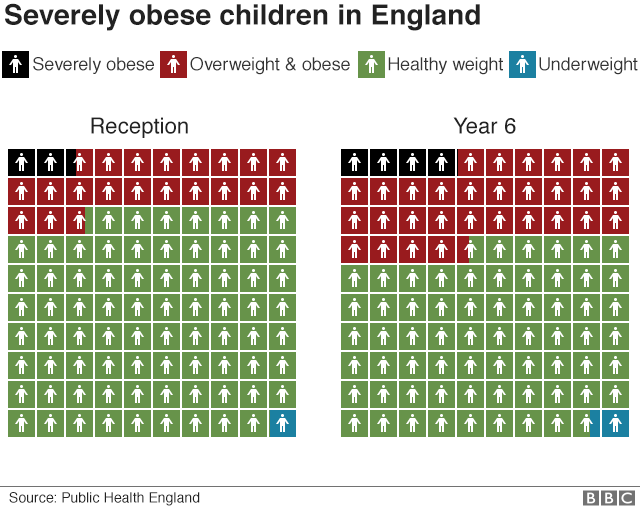Too many babies overfed, experts fear
- Published

It's time to tackle over-eating from birth to make sure children get the best start in life, according to Public Health England.
It comes as government advisers publish new guidance, external - the first in more than 20 years - on feeding babies.
That report suggests three-quarters of UK babies and toddlers may be eating more calories than they should.
The same proportion weighed more than the ideal weight for their age, when plotted on growth charts.
The data comes from the Infant Feeding Survey, external and the Diet and Nutrition Survey of Infants and Young Children, external carried out in 2010 and 2011.
Public Health England says more up-to-date statistics are needed and is recommending the Department of Health and Social Care considers this.
Obesity
Experts know that people who are overweight as children are more likely to be overweight as adults.
A link with diet in early infancy is less clear.
Nearly a quarter of children in England are obese or overweight at four to five years old.

Part of the next phase of the government's plan to tackle childhood obesity, external includes examining whether baby food is healthy enough and whether it contains too much sugar.
The new infant feeding guidelines from the Scientific Advisory Committee on Nutrition (SACN) recommend:
Babies should be exclusively breastfed for around the first six months of life
Solid foods can be introduced at around six months
Cows' milk should not be given until 12 months
Avoid high sugar or high salt foods
Foods containing peanut and hens' eggs can be introduced at six months because delaying this might increase the risk of food allergy (but seek advice if there is a strong family history of food allergy)
Prof Mary Fewtrell, from the Royal College of Paediatrics and Child Health, said they noted the concerns raised and said the prevalence of overfeeding and overweight infants should be monitored and addressed.
Prof Louis Levy, head of nutrition science at PHE, said "exclusive breastfeeding until six months of age and not introducing solid foods until around this time" would help avoid infants becoming "too heavy".
"Further consideration is needed on ways to monitor overfeeding and overweight prevalence in infants, to help give them the best start in life," Dr Levy said.
A Department of Health and Social Care spokesperson said: "Children aged up to 2.5 years are assessed for healthy weight and nutrition during universal visits - delivered locally by health visitors - who are responsible for measuring and recording weight where there may be a concern.
"While there are currently no plans to reinstate the Infant Feeding Survey, we will consider the SACN report's findings."

Does your baby weigh more than the ideal weight for their age? Share your experiences by emailing haveyoursay@bbc.co.uk, external.
Please include a contact number if you are willing to speak to a BBC journalist. You can also contact us in the following ways:
WhatsApp: +447555 173285
Tweet: @BBC_HaveYourSay, external
Send pictures/video to yourpics@bbc.co.uk, external
Send an SMS or MMS to 61124 or +44 7624 800 100
Please read our terms and conditions and privacy policy
- Published24 June 2018

- Published24 June 2018

- Published27 June 2018
